Washer: Why won't my washing machine agitate or spin?
Many components come into play when the washer's spin basket or agitator moves, and a problem with any of them could prevent the washer from agitating or spinning.
For top-load, direct-drive washers (washers whose lid doesn't lock during the wash portion of the cycle), worn agitator dogs can prevent the agitator from moving. Troubleshooting the washing machine agitator may fix the problem. A broken agitator or a failed gear case can prevent the washer from agitating. A bad clutch, worn clutch band or broken drive block could prevent the basket from spinning. A broken motor coupler, failed lid switch or bad timer can prevent this type of washer from spinning or agitating.
On top-load, vertical modular washers (washers whose lid is always locked during the entire wash cycle), a failed shifter assembly or worn drive belt can prevent the washer from agitating or spinning the wash load. Watch our video on how to troubleshoot a top-load washer that won't drain or spin for solutions for agitation and spin problems on both types of top-load washers.
Front-load washers spin or tumble the load at a slower speed to agitate the garments in the wash portion of the cycle. A broken door lock, bad motor control board or failed main electronic control board can prevent a front-load washer from tumbling. A front-load washer won't spin if it can't drain out the water so a failed drain pump can prevent this type of washer from spinning. A broken shock absorber can also prevent a front-load washer from spinning because the control will detect excessive tub vibration when a shock can't help stabilize the tub.
Electronically-controlled washers often display an error code when the washer agitate or spin the load. If your washer displays a code, look it up on our washer error code charts and follow the troubleshooting advice for that code to fix your washer.

THESE REPAIRS MAY HELP SOLVE YOUR WASHER PROBLEM
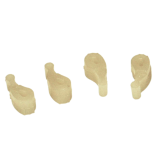
Replace the washer agitator dogs
Agitator dogs are small cams, located within the top half of the agitator, that control the agitator's movements. The dogs ratchet across the gear teeth in one direction and dig into the gear teeth in the opposite direction to create agitation. If the top half of the agitator spins freely, instead of ratcheting, replace the the agitator dogs.
Washer agitator dogs

How to replace the agitator dogs in a top-load washer
When the top half of the agitator in a top-load washer doesn't agitate as it should, or if you can turn the agitator back and forth freely, it could mean the agitator dogs are worn out. This DIY repair guide and video show how to replace the agitator dogs in less than 15 minutes.
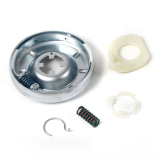
Repair or replace the direct-drive washer clutch
The direct-drive washer clutch assembly is mounted above the direct-drive transmission under the outer washer tub. The clutch releases the brake and allows the basket to spin. If the clutch is worn out or isn't releasing the brake properly, either repair the clutch using a clutch band kit or replace it using a clutch replacement kit. A common symptom of a worn-out clutch is wet clothes at the end of the spin cycle because the washer isn't spinning fast enough or at all.
Repair or replace the direct-drive washer clutch
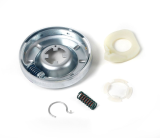
How to replace the clutch assembly in a top-load washer
If the washer spins when the basket is empty but not when the basket is full, the problem could be the clutch assembly. These steps explain how to replace it.
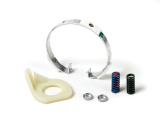
How to replace the clutch band in a top-load washer
When a top-load washer won't spin when clothes are in the basket but spins okay when it's empty, it could be that the clutch band is worn. This DIY washer repair guide and video explain how to replace the clutch band.
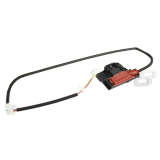
Replace the washer lid switch
The lid switch on a top-load washer is a safety switch that detects whether the washer lid is closed. The lid must be closed when the basket spins; if the washer incorrectly senses that the lid is open, it won’t spin and drain after the wash cycle.
Some top-load models require that the washer lid be closed before the washer drive motor runs. An open lid prevents some top-load washers from filling.
If the lid switch isn't detecting whether the lid is closed, replace the switch.
Washer lid switch
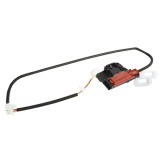
How to replace the lid switch/lock assembly on a top-load washer
When a top-load washer won't start or won't spin, it could mean a broken lid switch/lock assembly. This DIY repair guide and video show how to easily replace the lid switch/lock assembly on a top-load washer.

How to replace the lid switch in a direct-drive top-load washer
If your top-load washer won't spin, the lid switch might be broken. This repair guide and video explain how to replace the lid switch in less than 30 minutes.
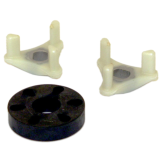
Replace the washer motor coupler
The motor coupler is a flexible coupling on the motor shaft connection to the direct-drive gearbox. The motor coupler protects the drive motor from damage if the drive system seizes up. If the washer fills and drains but won't agitate or spin even though the drive motor runs (and typically buzzes), replace the motor coupler.
Washer motor coupler
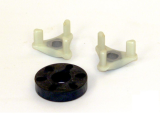
How to replace the motor coupler on a top-load washer
Does your top-load washer drain, but not agitator or spin? The motor coupler might be broken. This easy-to-follow repair guide and video show how to replace a motor coupler in a top-load washing machine.
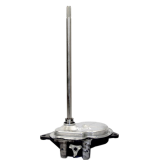
Replace the washer gearcase
In a direct-drive top-load washer, the gearcase drives the agitator and the spin basket.The washer gearcase has internal gears that create the agitation motion. For the spinning motion of the spin basket, it shifts the drive shaft and spins the drive tube. If the gearcase in a direct-drive washer locks up or it doesn't work properly in the agitation or spin mode, replace it. The gearcase typically makes a grinding noise and may leak oil when it's failed.
Washer gearcase
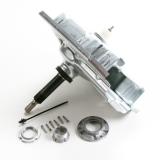
How to replace the gear case in a top-load washer
If your top-load washer won't agitate or spin, and it makes a grinding sound, the gear case might be the problem. This easy-to-follow repair guide and video show how to replace the gear case in a top-load washing machine.
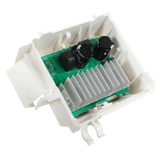
Replace the washer motor control board
The motor control board is a circuit-control board in a front-load washer that's usually in the bottom of the washer next to the drive motor. It monitors and controls the drive motor speed and direction for the tumble and spin actions during the cycle. If the motor doesn't run, the motor control board might need to be replaced.
Washer motor control board
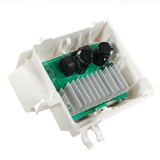
How to replace a motor control board on a front-load washer
If your front-load washer doesn't spin or spins at the wrong speed, the problem could be the motor control board. This repair guide explains how to replace the motor control board in 30 minutes.
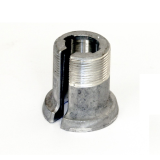
Replace the washer drive block
The drive block, which attaches to the top of the spin tube, rotates the spin basket when the washer is in spin mode. If the drive block wears out, the basket wobbles and rattles during the spin mode or won't spin at all. Before replacing the drive block, make sure the spanner nut under the agitator that holds the spin basket against the drive block isn't loose. If the spanner nut is tight and the basket still wobbles, replace the drive block.
Washer drive block
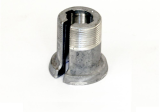
How to replace the drive block on a top-load washer
If your top-load washer's spin basket rattles and wobbles when spinning, or if it won't spin at all, it could mean the drive block is worn. This repair guide and video explain how to easily replace the drive block.
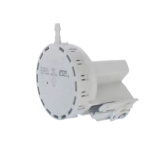
Replace the washer water-level pressure switch
The water-level pressure switch detects the water level in the wash tub. If the water-level pressure switch is defective, the washer won't fill properly. It could not fill at all or it could overfill even to the point of overflowing. If the pressure switch doesn't accurately detect and control the water level in the washer, replace it.
Washer water-level pressure switch
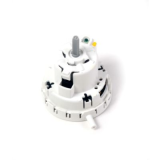
How to replace the water level pressure switch on a direct-drive top-load washer
When a top-load washer overfills with water, or when it won't fill at all, the water level pressure switch might have given out. This repair guide and video show how to replace the water level switch in 30 minutes or less.
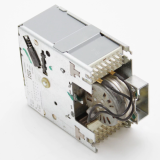
Replace the washer timer
The timer — also called a cycle selector — is the dial you use to set the cycle on a washing machine with mechanical controls. The timer makes the washer move through its cycles, from initial filling to final spin. Replace the timer if it doesn’t advance the washer through its cycles.
Washer timer
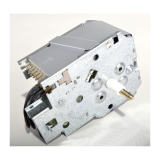
How to replace the timer in a direct-drive top-load washer
If your top load washer doesn't advance through the cycles or gets stuck in one cycle, it's likely the timer has failed. This DIY repair guide and video show how to replace the timer in less than 30 minutes.
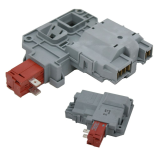
Replace the washer door lock assembly
The door lock assembly on a front-load washer includes a safety switch that detects whether the washer door is closed, a latch and a locking mechanism. If any of these components fails when the door is open, the door won't lock; if a component fails with the door is closed, the door won't open. Replace the entire assembly if any component fails.
Washer door lock assembly

How to replace the door lock assembly on a front-load washer
Does the door on your front-load washer door refuse to lock? The problem could be the door lock. This repair guide and video show how to replace the door lock assembly on a front-load washing machine in 6 steps.
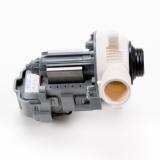
Repair or replace the washer drain pump
The drain pump removes water from the washer at the appropriate times during the wash cycle. The pump's bearing can seize, the seal can fail or the impeller blades can break. The belt on a belt-driven pumps can break, and the pulley can shear off. A humming noise when the washer is full of water is a common symptom of a failing pump. In some cases, you can repair the pump by clearing it of debris, fixing wiring failures or replacing a seal. If the pump can't be repaired or rebuilt, replace it.
Repair or replace the washer drain pump
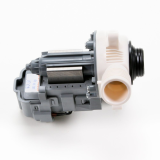
How to replace the drain pump in a top-load washer
Is your top-load washer not draining? A faulty drain pump could be to blame. This repair guide and video show how to easily replace the drain pump in a top-load washing machine.
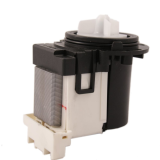
How to replace the drain pump on a front-load washer
Is your front-load washer not draining? The drain pump might be the problem. This DIY repair guide and video explain how to easily replace the drain pump in a front-load washer.
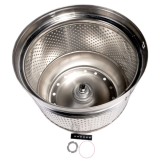
Repair or replace the washer spin basket
The spin basket is the perforated container that holds laundry during the wash cycle. The spin basket is inside the stationary outer tub. If the spanner nut becomes so loose that the spin basket doesn't rotate properly, tightening the spanner nut can often fix the problem. If the spin basket was damaged while the spanner nut was loose, replace the spin basket. Also replace the spin basket if it's scratched or damaged by an object left in a laundered garment.
Repair or replace the washer spin basket
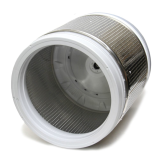
How to replace the spin basket in a top-load washer
A rusted washer spin basket could leave marks on your garments. This DIY repair guide and video show how to easily replace a rusted or damaged spin basket.
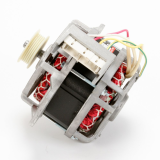
Replace the washer drive motor
The washer's drive motor provides the force to rotate the spin basket. It also drives the shaft of the gearcase to move the agitator in a top-load washer. It's either attached to a drive pulley with a belt or is directly attached to the drive shaft. If the motor windings fail or the bearings on the motor lock up, the motor won't run. Replace the drive motor if it's defective.
Washer drive motor
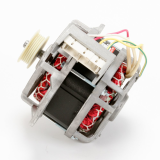
How to replace the drive motor in a top-load washer
Top-load washer won't spin or agitate? Might be the drive motor. This washer repair guide and video explain how to replace the drive motor in top-load washing machine.
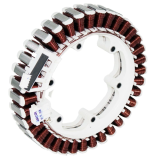
How to replace the direct-drive motor on a front-load washer
When a direct-drive front-load washer won't spin and displays an error code, it could mean the drive motor has failed. This DIY repair guide shows how to replace the direct-drive motor on a front-load washing machine.
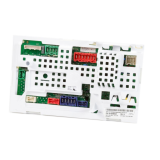
Replace the washer main control board
The main electronic control board, also called the mother board, governs the timing and execution of the washer component functions. It controls the fill valves, the drive motor and the drain pump.
Washer main control board
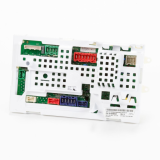
How to replace the electronic control board on a top-load washer
A failed top-load washer electronic control board can cause multiple problems, from no display lights to the washer not filling, spinning or draining. If you or a service technician determine that the electronic control is faulty, this repair guide and video show how to replace it.
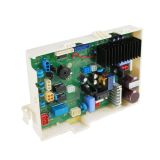
How to replace the machine control board in a front-load washer
A failed front-load washing machine control board has several symptoms, including the washer not starting, filling, spinning or draining. If you or a service technician determine that the machine control board has failed, this repair guide shows how to replace it.
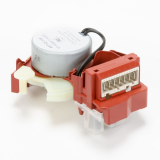
Replace the washer shifter assembly
The shifter assembly-also called the actuator-in a top-load washer is mounted on the bottom of the gearcase. The shifter assembly's motor shifts the drive system between the agitation mode and the spin mode. A sensor on the shifter monitors the position of the drive system during the wash cycle. If the motor, sensor or mechanical parts of the shifter assembly fail, the washer stops and signal an error code. Replace the shifter assembly if it malfunctions.
Washer shifter assembly
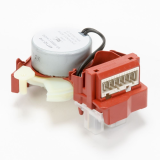
How to replace the shifter assembly in a top-load washer
If your top-load washer won't agitate and displays an error code, it's possible the shifter assembly has failed. This DIY repair guide and video explain how to replace the shifter assembly on a top-load washer.
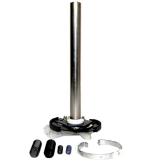
Replace the washer basket drive
The basket drive is on top of the transmission and clutch assembly in the washer drive system. The basket drive houses the brake mechanism for the spin basket and has the spin tube shaft that rotates the spin basket in the spin mode. The washer won't spin and you'll hear screeches and squeals when the basket drive fails. Replace the basket drive if it's worn or broken.
Washer basket drive
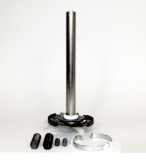
How to replace the basket drive in a top-load washer
Does your top-load washer screech or squeal when it spins? The basket drive could be worn or broken. This step-by-step repair guide and video explain how to replace the basket drive in a top-load washing machine.
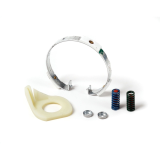
Replace the washer clutch band
The clutch releases the brake in the drive system to allow the basket to spin when the washer is in spin mode. The clutch band creates friction between the clutch hub and the clutch lining, causing the entire clutch assembly to rotate and release the brake. A worn clutch band won't release the brake so the washer won't spin. Replace the clutch band if it's worn or broken.
Washer clutch band

How to replace the clutch band in a top-load washer
When a top-load washer won't spin when clothes are in the basket but spins okay when it's empty, it could be that the clutch band is worn. This DIY washer repair guide and video explain how to replace the clutch band.
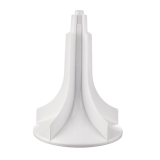
Replace the washer agitator
The agitator is mounted inside the spin basket of the washer. The agitator rotates back and forth and moves the clothes inside the spin basket to achieve effective cleaning during the agitation cycle. Replace the agitator if it's cracked or broken, or if the top part of the agitator is not ratcheting properly, which indicates damage to the teeth that engage the agitate dogs.
Washer agitator
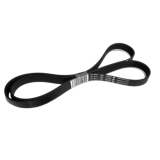
Replace the washer drive belt
Some washes have a drive systems that uses a belt to transmit the rotation of the drive motor pulley to the gear case or the spin basket pulley. If the motor runs but the spin basket or agitator does not move, then the belt may be broken. If the belt is damaged or broken, replace it.
Washer drive belt
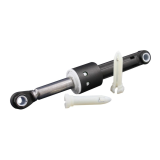
Replace a washer shock absorber
Shock absorbers absorb the vibrations and movements of the outer washer tub on a front-load washer. The shock absorbers also hold the outer tub in place to prevent damage, while allowing reasonable movement during spin and agitation modes. A common symptom of a failing shock absorber is knocking and tub instability at high spin speeds. If the shock absorbers don't maintain the stability of the tub, replace them.
Replace a washer shock absorber
Most common symptoms to help you fix your washers
Choose a symptom to see related washer repairs.
Main causes: broken lid switch or lid lock, bad pressure switch, broken shifter assembly, faulty control system…
Main causes: lack of electrical power, wiring failure, bad power cord, electronic control board failure, bad user interf…
Main causes: leaky water inlet valve, faulty water-level pressure switch, bad electronic control board…
Main causes: water heater failure, bad water temperature switch, faulty control board, bad water valve, faulty water tem…
Main causes: no water supply, bad water valves, water-level pressure switch failure, control system failure, bad door lo…
Main causes: worn agitator dogs, bad clutch, broken motor coupler, shifter assembly failure, broken door lock, suspensio…
Main causes: unbalanced load, loose spanner nut, worn drive block, broken shock absorber or suspension spring, debris in…
Main causes: clogged drain hose, house drain clogged, bad drain pump, water-level pressure switch failure, bad control b…
Main causes: bad lid switch or door lock, bad timer or electronic control board, wiring failure, bad water inlet valve a…
Most common repair guides to help fix your washers
Effective articles & videos to help repair your washers
Use the advice and tips in these articles and videos to get the most out of your washer.
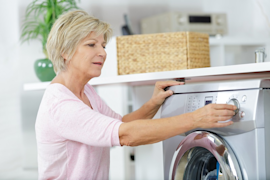
Find tips for using your washing machine efficiently to save energy and help reduce utility bills.…

Learn about all the convenient features on our Sears PartsDirect website that make your parts purchases easier.…
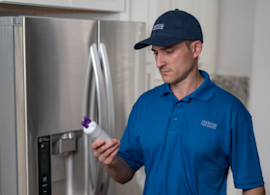
Get answers to frequently asked questions about Sears and Sears PartsDirect.…
